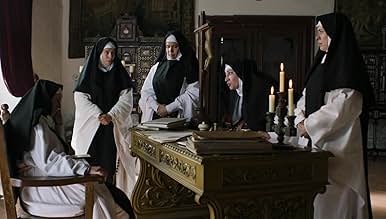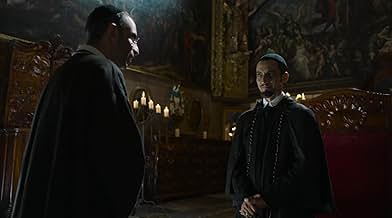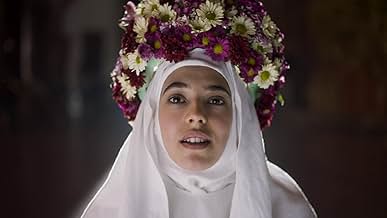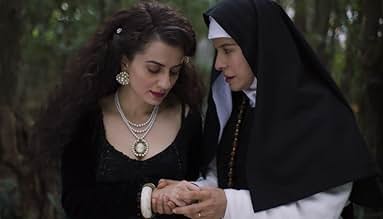This series dramatizes the life of Juana Inés de la Cruz, a renowned writer, nun and influential political figure in 17th-century Mexico.This series dramatizes the life of Juana Inés de la Cruz, a renowned writer, nun and influential political figure in 17th-century Mexico.This series dramatizes the life of Juana Inés de la Cruz, a renowned writer, nun and influential political figure in 17th-century Mexico.
- Awards
- 11 wins & 3 nominations total
Browse episodes
Featured reviews
This story is about a person of whom I was not aware until watching it. After viewing, I read several articles on Juana Ines de la Cruz. The details of her life and her relations with those around her are somewhat obscure. Her life seems to still inspire speculation and fabrication of events that may not have happened. However, knowing something of the Roman Church and Spanish Inquisition, and having some understanding of classical learning in the Baroque era, I believe this to be an entirely credible construct of her life, providing some good possibilities for the motivations behind her actions. Now, if you are the type of moralistic Catholic who cannot believe that there are lesbians in convents, or that certain holy monastics have the same urges as others, don't bother watching this one. It is neither like The Song of Bernadette, nor like the splendid Spanish series on the life of Teresa of Avila. The production qualities are sometimes not the best, and I have never much cared for the use of two actresses to play the same character at different ages, but the sheer drama of the story redeems it. The intense psychological aspects of the characters, and the performances of these actors merit the highest praise. The subject matter is so compelling that you cannot stop watching it, and yet it doesn't lend itself to binge watching, because you will need time to absorb what you have just seen in a single episode.
I admired the beautiful work of Arantza Ruiz and Arcelia Ramirez. I was impressed by the work of Hernan de Riego , giving to his father Antonio only the intense nuances of power builded on vulnerability. And sure, I saw as delightful Carlos Valencia , creating a sort of Darth Vader in Romano - Catholic style
Yes, the acting is one of high virtues of series.
But, in same measure, a beautiful aspect is the care for atmosphere. Juana Ines is, not surprising, a manifesto of feminism. Its gift is to use the purpose for define a period and not make the history facts a piece of clay.
A film about power and wisedom.
Inspired made, proposing useful questions and giving to the Mexican XVII century status of seed for understand, properly, our time.
But, in same measure, a beautiful aspect is the care for atmosphere. Juana Ines is, not surprising, a manifesto of feminism. Its gift is to use the purpose for define a period and not make the history facts a piece of clay.
A film about power and wisedom.
Inspired made, proposing useful questions and giving to the Mexican XVII century status of seed for understand, properly, our time.
How sad that they used and abused such a good biopic and made the typical trash of lesbians, and corruption of the Church. You better get a good Biography, instead of wasting your time watching this fantasy. The guidelines for reviews here they say it's 10 lines. I really don't have much to say about this series. I have watched 4 episodes, and instead of getting better, it gets worse. It is sad they wasted so much talent, money and energy to advance the typical Hollywood immorality that they want to impose on every one as "normal". I have read Sor Juana Ines of the Cruz all my life. Biographies, and her poetry. As I said, it is a waste of time, and resources. They could have used the real, true story, and come up with something beautiful. Too bad.
I was amazed when I watched this series on Netflix this week. I really didn't know what to expect and was met with an impeccable production, script and editing. Sor Juana Inés de la Cruz is a literary figure of the 17th century and an icon of Mexican Culture but, ironically enough, very little is known of her. And yes, the story-telling does take some liberties with this but to enrich the narrative build, not for shock value. At least I didn't think so. After all, a character as strong as her surely wasn't bland or dull. Her rebellion, for example, is very likely as it is known from letters written by her that she did have a quarrel with her confessor, something unthinkable at the time. Why is is so outrageous then that a figure as her, or nuns at all, had a sexual orientation of any kind? I recommend this series for it's narrative proposal which is both constructive and daring. WARNING: Not suitable for history buffs who want a narrated documentary with "reenactments for dramatic purposes". After all, it's just good TV.
Details
- Release date
- Country of origin
- Official site
- Language
- Also known as
- Αδελφή Χουάνα Ινές
- Filming locations
- Production companies
- See more company credits at IMDbPro
Contribute to this page
Suggest an edit or add missing content


















